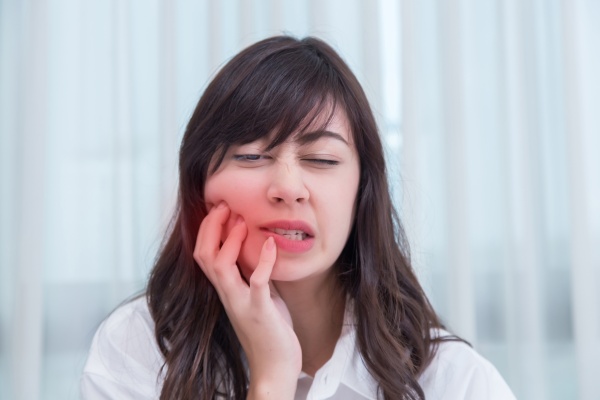Avoid Reconstruction by Managing Teeth Grinding, Clenching and TMJ

Teeth grinding, clenching and TMJ can cause major damage to your mouth over time. This damage can become so bad that it requires reconstruction.
A procedure like this can be invasive, time-consuming and painful. Since reconstructive surgery is a very extreme treatment, it is best to take preventative steps early on to give yourself the best possible chance of avoiding it.
Teeth grinding
Teeth grinding, also called bruxism, is often done unconsciously. Aside from grinding, you may also gnash or clench your teeth. This often occurs during sleep and is more likely caused by an abnormal bite or missing or crooked teeth.
A sleep disorder, such as sleep apnea, can be the cause of your grinding. Stress can also cause you to clench your jaw or experience teeth grinding during sleep.
Here is a list of different symptoms you might be experiencing if you are grinding or clenching your teeth at night.
If you are experiencing some of the following symptoms in the absence of other issues, it is a good indicator that it may be bruxism. Many of these symptoms can indicate other disorders, so speaking with your dentist can help you determine the cause.
Neck pain
All that clenching can sometimes incorporate the muscles of the neck. Neck pain commonly accompanies nighttime teeth grinding and other disorders that overlap with headaches.
Flattened or chipped teeth
When you grind your teeth, they become worn and flattened. In some cases, you can even chip a tooth from the intense pressure of your bite.
Pain inside the cheek
This could be a sign that you are biting down on the inside of the cheek while grinding. Note any cuts or sore spots that align with where your upper and lower teeth meet.
Sleep disruption
Pain from jaw clenching can be so bad that it wakes you up. By the time you are fully awake, you may have stopped clenching, so take note if you experience this symptom.
Tooth pain or increased tooth sensitivity
Your teeth may become more sensitive to hot or cold drinks. They may also be sore without explanation. Typically, this soreness will be near the surface of the teeth. While sensitivity is a common symptom of many issues, it can indicate bruxism.
TMJ
The gradual wear and tear to your joints over time does not affect just your hands and knees. There are joints in your jaw that are susceptible to wear and tear with time. The temporomandibular joints, called TMJ, control how you chew, speak and swallow. A TMJ disorder occurs when the joints get out of line or do not move as they should.
Clenching and grinding can aggravate these joint and cause TMJ disorder. You may experience pain while opening the jaw, stiffness in the joints and headaches.
Protect your teeth
Managing your grinding can reduce your chances of needing reconstructive surgery.
If you suspect that you are experiencing teeth grinding, clenching or TMJ issues, make an appointment with our office.
Request an appointment here: https://whiteflintfamilydental.com or call White Flint Family Dental at (301) 273-1085 for an appointment in our Rockville office.
Check out what others are saying about our services on Yelp: Read our Yelp reviews.
Recent Posts
Cosmetic dentists offer a variety of treatments that enhance the appearance of your smile. While these procedures are typically elective rather than essential, some cosmetic dental treatments also provide restorative benefits, improving the overall function of your teeth. Understanding these common treatments can help you decide which one is right for you.Over time, teeth can…
An experienced cosmetic dentist can provide dental veneers to help you regain your smile. The custom-fit shells can improve your looks. Each one can even provide support for your teeth. Here are the questions to ask your cosmetic dentist to find out if getting veneers will be a good decision for you.These thin shells go…
A routine dental cleaning plays a critical role in preventing cavities, gum disease, and other oral health concerns. In many cases, patients benefit from two dental cleaning appointments per year. However, certain individuals may require additional cleanings to maintain optimal oral health. A dentist may recommend more frequent visits based on risk factors, existing conditions,…
When gums start to recede and pull away from the teeth, it can alter the appearance of the smile and leave the teeth vulnerable to decay. A cosmetic dentist may fix receding gums, restoring the smile's appearance. While the focus will be on aesthetics, some cosmetic dental procedures may also protect your oral health.Gum recession…


